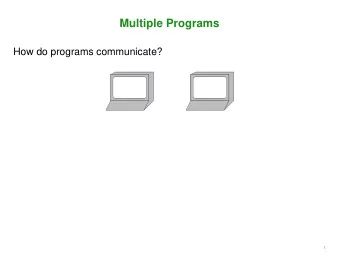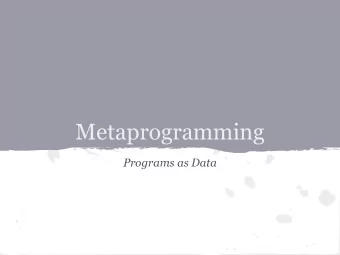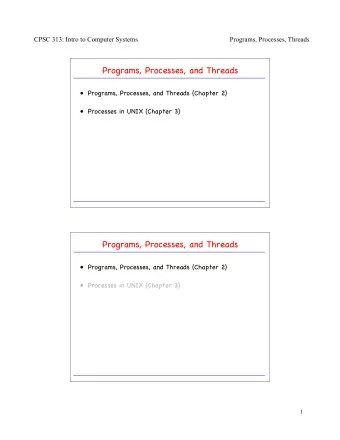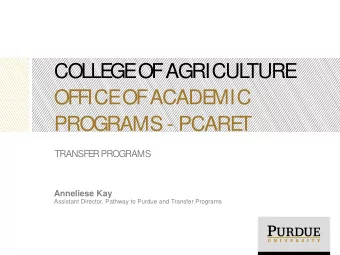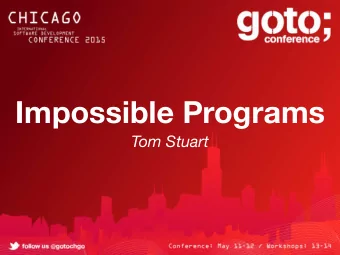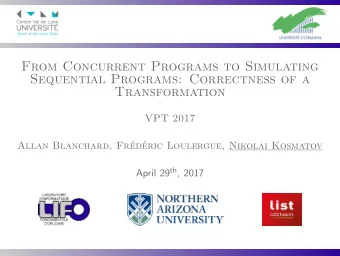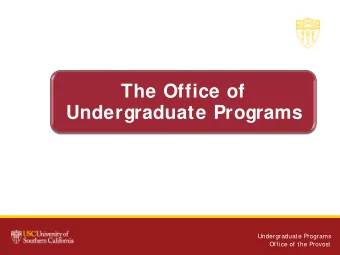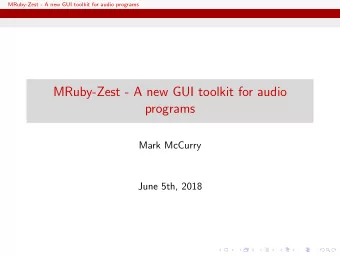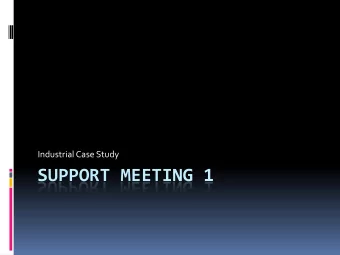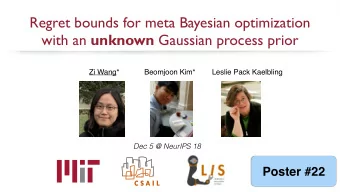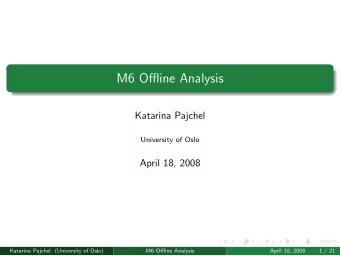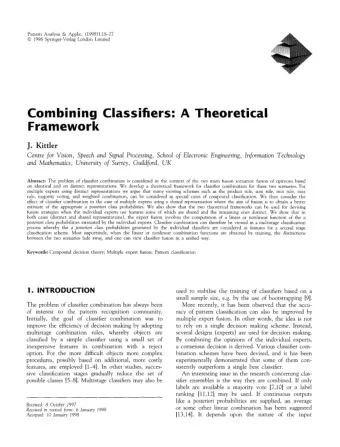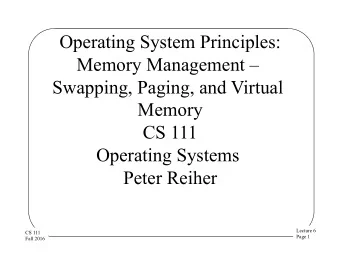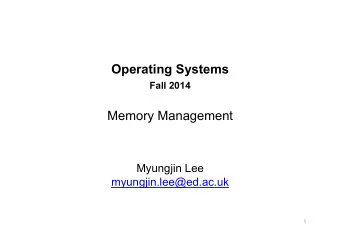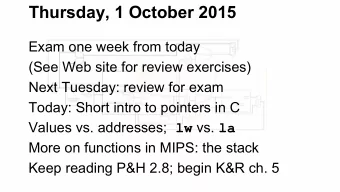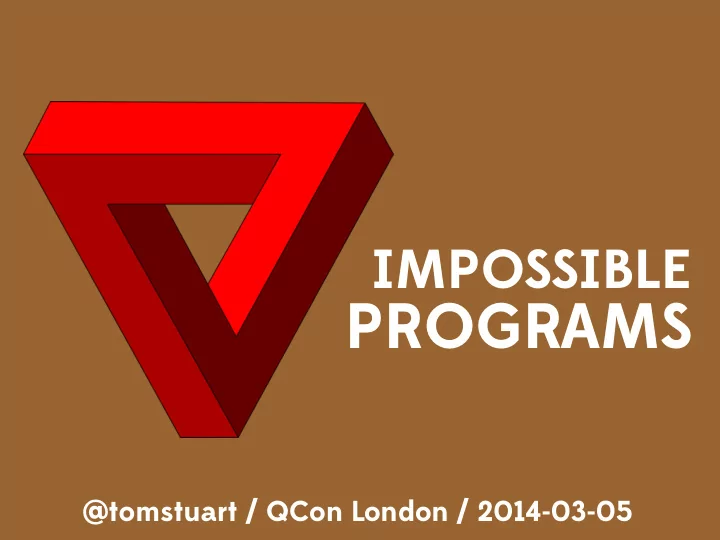
PROGRAMS @tomstuart / QCon London / 2014-03-05 PROGRAMS CANT DO - PowerPoint PPT Presentation
IMPOSSIBLE PROGRAMS @tomstuart / QCon London / 2014-03-05 PROGRAMS CANT DO EVERYTHING ho w can a PROGRAM be IMPOSSIBLE? WE DEMAND UNIVERSAL SYSTEMS Compare two programming languages, say Python and Ruby. We can translate any Python
IMPOSSIBLE PROGRAMS @tomstuart / QCon London / 2014-03-05
PROGRAMS CAN’T DO EVERYTHING
ho w can a PROGRAM be IMPOSSIBLE?
WE DEMAND UNIVERSAL SYSTEMS
Compare two programming languages, say Python and Ruby.
We can translate any Python program into Ruby. We can translate any Ruby program into Python. We can implement a Python interpreter in Ruby. We can implement a Ruby interpreter in Python. We can implement a Python interpreter in JavaScript. We can implement a JavaScript interpreter in Python. We can implement a Turing machine simulator in Ruby. We can implement Ruby as a Turing machine.
SKI calculus Tag systems Game of Life Ruby XSLT Lisp Register machines JavaScript Magic: The Gathering Python Partial recursive C functions Java Turing machines Lambda calculus Rule 110 C++ Haskell
Universal systems can run software . We don’t just want machines, we want general-purpose machines.
PROGRAMS ARE DATA
>> puts 'hello world' hello world => nil >> program = "puts 'hello world'" => "puts 'hello world'" >> bytes_in_binary = program.bytes. map { |byte| byte.to_s(2).rjust(8, '0') } => ["01110000", "01110101", "01110100", "01110011", "00100000", "00100111", "01101000", "01100101", "01101100", "01101100", "01101111", "00100000", "01110111", "01101111", "01110010", "01101100", "01100100", "00100111"] >> number = bytes_in_binary.join.to_i(2) => 9796543849500706521102980495717740021834791
>> number = 9796543849500706521102980495717740021834791 => 9796543849500706521102980495717740021834791 >> bytes_in_binary = number.to_s(2).scan(/.+?(?=.{8}*\z)/) => [ "1110000", "01110101", "01110100", "01110011", "00100000", "00100111", "01101000", "01100101", "01101100", "01101100", "01101111", "00100000", "01110111", "01101111", "01110010", "01101100", "01100100", "00100111"] >> program = bytes_in_binary.map { |string| string.to_i(2).chr }.join => "puts 'hello world'" >> eval program hello world => nil
UNIVERSAL SYSTEMS + PROGRAMS ARE DATA = INFINITE LOOPS
Every universal system can simulate every other universal system, including itself. More specifically: every universal programming language can implement its own interpreter.
def evaluate(program, input) # parse program # evaluate program on input while capturing output # return output end
>> evaluate('print $stdin.read.reverse', 'hello world') => "dlrow olleh"
def evaluate(program, input) # parse program # evaluate program on input while capturing output # return output end def evaluate_on_itself(program) evaluate(program, program) end
>> evaluate_on_itself('print $stdin.read.reverse') => "esrever.daer.nidts$ tnirp"
def evaluate(program, input) # parse program # evaluate program on input while capturing output # return output end def evaluate_on_itself(program) evaluate(program, program) end program = $stdin.read if evaluate_on_itself(program) == 'no' print 'yes' else print 'no' end does_it_say_no.rb
$ echo 'print $stdin.read.reverse' | ruby does_it_say_no.rb no $ echo 'print "no" if $stdin.read.include?("no")' | ruby does_it_say_no.rb yes $ ruby does_it_say_no.rb < does_it_say_no.rb ???
d o e s does_it_say_no.rb _ i t _ s a y _ n o . r b yes never finish no other output? ✘ ✔ ✘ ✘
Ruby is universal so we can write #evaluate in it so we can construct a special program that loops forever
s o here' s one IMPOSSIBLE PROGRAM
Sometimes infinite loops are bad. We could remove features from a language until there’s no way to cause an infinite loop.
• No unlimited iteration remove while loops etc, only allow iteration over finite data structures • No lambdas to prevent ( λ x.x x)( λ x.x x) • No recursive method calls e.g. only allow a method to call other methods whose names come later in the alphabet • No blocking I/O • ...
The result is called a total programming language. It must be impossible to write an interpreter for a total language in itself.
if we could write #evaluate in a total language then we could use it to construct a special program that loops forever but a total language doesn’t let you write programs that loop forever so it must be impossible to write #evaluate in one
(That’s weird, because a total language’s interpreter always finishes eventually, so it feels like the kind of program we should be able to write.)
We could write an interpreter for a total language in a universal language, or in some other more powerful total language.
okay but WHAT ABOUT REALITY?
#evaluate is an impossible program for any total language, which means that total languages can’t be universal. Universal systems have impossible programs too.
input = $stdin.read puts input.upcase This program always finishes.* * assuming STDIN is finite & nonblocking
input = $stdin.read while true # do nothing end puts input.upcase This program always loops forever.
Can we write a program that can decide this in general? (This question is called the halting problem .)
input = $stdin.read output = '' n = input.length until n.zero? output = output + '*' n = n - 1 end puts output
require 'prime' def primes_less_than(n) Prime.each(n - 1).entries end def sum_of_two_primes?(n) primes = primes_less_than(n) primes.any? { |a| primes.any? { |b| a + b == n } } end n = 4 while sum_of_two_primes?(n) n = n + 2 end print n
def halts?(program, input) # parse program # analyze program # return true if program halts on input, false if not end
>> halts?('print $stdin.read', 'hello world') => true >> halts?('while true do end', 'hello world') => false
def halts?(program, input) # parse program # analyze program # return true if program halts on input, false if not end def halts_on_itself?(program) halts?(program, program) end program = $stdin.read if halts_on_itself?(program) while true # do nothing end end do_the_opposite.rb
$ ruby do_the_opposite.rb < do_the_opposite.rb
d o _ t h do_the_opposite.rb e _ o p p o s i t e . r b eventually finish loop forever ✘ ✘
Every real program must either loop forever or not, but whichever happens, #halts? will be wrong about it. do_the_opposite.rb forces #halts? to give the wrong answer.
if we could write #halts? then we could use it to construct a special program that forces #halts? to give the wrong answer but a correct implementation of #halts? would always give the right answer so it must be impossible to write #halts?
okay but WHO CARES?
We never actually want to ask a computer whether a program will loop forever. But we often want to ask computers other questions about programs.
def prints_hello_world?(program, input) # parse program # analyze program # return true if program prints "hello world", false if not end
>> prints_hello_world?('print $stdin.read.reverse', 'dlrow olleh') => true >> prints_hello_world?('print $stdin.read.upcase', 'dlrow olleh') => false
def prints_hello_world?(program, input) # parse program # analyze program # return true if program prints "hello world", false if not end def halts?(program, input) hello_world_program = %Q{ program = #{program.inspect} input = $stdin.read evaluate(program, input) print 'hello world' } prints_hello_world?(hello_world_program, input) end
if we could write #prints_hello_world? then we could use it to construct a correct implementation of #halts? but it’s impossible to correctly implement #halts? so it must be impossible to write #prints_hello_world?
Not only can we not ask “does this program halt?”, we also can’t ask “does this program do what I want it to do?”.
This is Rice’s theorem: Any interesting property of program behavior is undecidable.
WHY DOES THIS HAPPEN?
We can’t look into the future and predict what a program will do. The only way to find out for sure is to run it. But when we run a program, we don’t know how long we have to wait for it to finish. (Some programs never will.)
Any system with enough power to be self-referential can’t correctly answer every question about itself. We need to step outside the self-referential system and use a different, more powerful system to answer questions about it. But there is no more powerful system to upgrade to.
HOW CAN WE COPE?
Recommend
More recommend
Explore More Topics
Stay informed with curated content and fresh updates.
